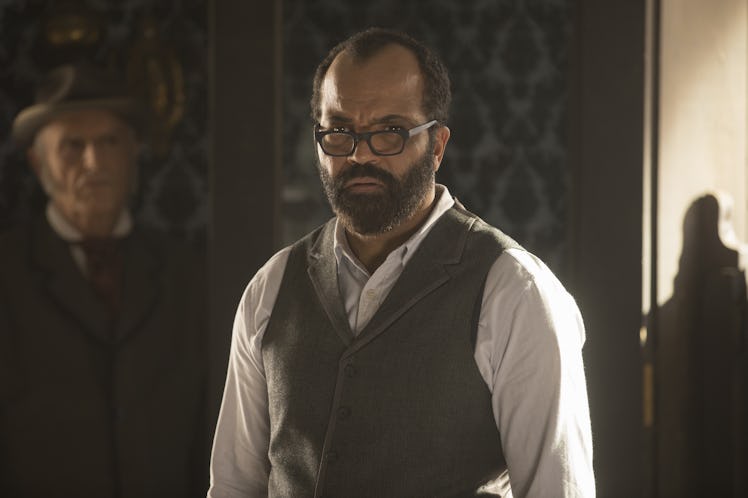
Jeffrey Wright Actually Weighs In On Those Major Bernard 'Westworld' Theories – EXCLUSIVE
Watching Westworld is like taking two steps forward, one step back. Every time the show explains something, three more questions pop up in its place. No character on the show is more mysterious than Bernard, the park's Head of Programming who was revealed to be a host in Season 1. Questions abound about the empathetic host: Is there more than one Bernard on Westworld? How much autonomy does he have? What is his role in the hosts' rebellion? Luckily, Bernard himself, Jeffrey Wright, stepped in to answer my questions and weigh in on a few major Bernard theories, and now I'm only slightly confused instead of totally, completely lost.
In Season 2 Episode 7, "Les Écorchés," Delos exec Charlotte Hale finally learned the truth about Bernard — a truth that fans have known since Season 1. Charlotte, the Delos security team, and Bernard are investigating one of the park's many secret labs when they stumble upon a secret door leading to a back room. Inside stand a handful of Bernard "clones" in various states of distress — one has a giant gash in his head, one has the skin on its face missing, and another is frozen with his eyes open — and suddenly, Charlotte realizes that Bernard is one of Ford's host creations.
This reveal seems to confirm the popular theory that there's more than one Bernard, but Wright suggests otherwise:
There is only one Bernard. Despite what you saw last week, there’s only one Bernard.
I'm looking at at least three Bernards right now, so I'm a little confused. But Westworld has always been about consciousness, not body count, so it's very possible that the three Bernards on screen are simply his outer shells. If there's only one Bernard, that means that the memories and experiences of each Bernard clone must be uploaded to some sort of central server and collected — which is either good or bad, depending on what you think about Ford's influence.
OK, one fan theory bites the dust. What about the theory that Bernard and Teddy are the same person? These "B equals T" theorists, as Wright puts them, believe that Teddy's consciousness was implanted into Bernard's body sometime between Bernard's goings-on with Charlotte and when he wakes up on the beach. If you're a die-hard B=T stan, get ready to be disappointed: When Wright read this fan theory, he thought it was so funny that he shared it with his co-stars (um, can I get in on that group text, please?). "This whole Bernard/Teddy theory. Someone thought that was a good idea ... But yeah, no," he says.
As fans have learned more about Bernard's "time slippage" — his memories have been scrambled out of chronological order — it's easy to wonder whether Bernard is a reliable narrator. If Bernard can't even keep track of his own memories, how can we trust that he's conveying the truth to the audience? One fan theory has taken Bernard's unreliability one step further by suggesting that he's not only lying to the audience, but also to Charlotte.
At the end of Season 2 Episode 7, Bernard (in "analysis" mode, because it forces him to be honest) tells Charlotte that Peter Abernathy's control unit is in "Sector 16 Zone Four," aka the Valley Beyond. To many eagle-eyed fans, this seemed a little too convenient: Ford has clearly planted something in the Valley Beyond, so it seems unlikely that Abernathy's control unit would coincidentally appear there. Could Bernard be purposefully lying to Charlotte — and could Ford have told him to do it? Fans have already seen that Ford can take control over Bernard's actions, so it's possible that Ford is pulling the strings even more than Bernard, and the audience, realize.
Wright won't confirm or deny this theory, but he did tease that this tension over autonomy forms the "core" of Bernard and Ford's relationship:
The question of specific control driving the hosts: Is it self-generated, or is it simply programmed and specifically programmed by Ford or by Arnold? ... Then on the larger level, the question is, are these new, independent organisms? New life forms? Or are they simply creations? And so at what point does artificial intelligence become its own entity? ... As it relates to Bernard and Ford, that tension is core to their relationship. So, that's where we go with that.
Classic Bernard. Answering one question with four new ones.
As we approach the end of Season 2, Wright has one request: Keep the theories coming. The Westworld star promises that he does "dig through the fan theories," and he enjoys seeing fans try to "piece together where we're heading." Says Wright:
This year, what’s been cool is to discover that the ways in which people are using the technology that the storytelling is founded upon, and also some of the narrative constructs that are born out of that, to try to piece together where we’re heading.
However, no matter how smart the sleuths over at Reddit think they are, Wright says that, more often than not, they're incorrect:
Most of the theories, if not everything that I’ve read, is completely off the mark. But I will say that it’s really, it’s really exciting to see people clue in, or I should say, bite on, to the proper bait in the proper way, but not entirely so.
Your theories may be wrong, Westworld fans, but at least Jeffrey Wright is reading your half-baked ideas. That has to count for something.
Westworld airs at 9 p.m. ET Sundays on HBO.